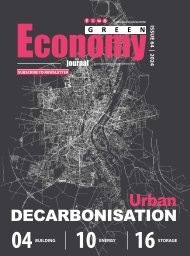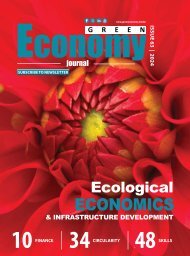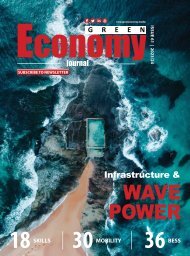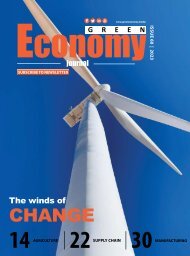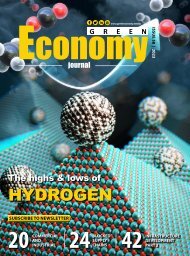Green Economy Journal Issue 62
You also want an ePaper? Increase the reach of your titles
YUMPU automatically turns print PDFs into web optimized ePapers that Google loves.
MOBILITY<br />
SA’s automotive manufacturing<br />
industry is seriously at risk if the<br />
country does not transition.<br />
“The world does need to make this change to a greener future. But<br />
it’s not as simple as it sounds to say, ‘Well, we’ll have a just transition,<br />
so there’ll be no losers,’” Patel acknowledges.<br />
“What do you do with the more than 100 000 service station<br />
attendants and mechanics? Because we don’t control technological<br />
development and it may be then everybody ends up charging the<br />
cars at home.<br />
“You have got to be able to navigate with a lot of thought and<br />
that is really what the White Paper does – and that is why it has<br />
taken a bit of time to get all of those things on the table to balance<br />
them carefully.”<br />
Battery energy<br />
storage powered<br />
by renewable energy<br />
is the future, and it<br />
is feasible in South<br />
Africa right now!<br />
Sodium-sulphur batteries (NAS ® Batteries),<br />
produced by NGK Insulators Ltd., and<br />
distributed by BASF, with almost 5 GWh<br />
of installed capacity worldwide, is the<br />
perfect choice for large-capacity stationary<br />
energy storage.<br />
Dr Norman Lamprecht, the executive manager of trade, research<br />
and exports for Naamsa, says that one of the inhibitors is the price<br />
differential between a battery electric vehicle and an ICEV is around<br />
52%, with no demand side-support in place to address this.<br />
“In many other countries in the world the governments provide<br />
an incentive such as cash grants or tax benefits to reduce the price<br />
gap in order to stimulate sales of EVs,” Lamprecht says.<br />
The lack of policy incentives from the government has been a big<br />
reason for South Africa losing the EV race and is one of the reasons<br />
this White Paper (which was meant to come out in 2021) is such a<br />
big deal.<br />
Patel says they expected the price differential to come down in<br />
the next eight or so years, adding, “It may be quicker. Technology<br />
always surprises everybody.”<br />
The cost-benefit assumption of the just transition<br />
Electrifying South Africa’s transport sector will contribute to the<br />
country’s global decarbonisation goals.<br />
THOUGHT [ECO]NOMY<br />
ELECTRIC VEHICLES WHITE PAPER | Department of Trade, Industry and Competition (dtic) |<br />
[November 2023]<br />
A key characteristic of NAS ® Batteries is the<br />
long discharge duration (+6 hours), which<br />
makes the technology ideal for daily cycling<br />
to convert intermittent power from renewable<br />
energy into stable on-demand electricity.<br />
NAS ® Battery is a containerised solution,<br />
with a design life of 7300 equivalent cycles<br />
or 20 years, backed with an operations and<br />
maintenance contract, factory warranties, and<br />
performance guarantees.<br />
Superior safety, function and performance are<br />
made possible by decades of data monitoring<br />
from multiple operational installations across<br />
the world. NAS ® Battery track record is<br />
unmatched by any other manufacturer.<br />
READ REPORT<br />
greeneconomy/report recycle<br />
Adoption of EVs has increased globally, driven in part by greater government incentives such as tax breaks<br />
and targeted subsidies for producers and consumers as well as demand trends. Several regulators have<br />
also decided to ban the sale of new Internal Combustion Energy (ICE) vehicles within the next 12 years as<br />
part of their contribution to achieving net zero emissions by 2050, including markets like the EU and UK.<br />
These global trends will have a significant impact on South Africa and its economy. Not only is South<br />
Africa the largest automotive manufacturing hub on the African continent, but it is also highly integrated<br />
into global supply chain that draws components from across the world, including the SADC region, and<br />
exports the final consumer product to more than 150 countries worldwide. As a larger number of countries<br />
transition both their consumer and production markets to EVs, the impacts will be significant for South<br />
African producers. The effective bans on ICE vehicles in key markets like the EU and UK will be profound, as<br />
they absorb half of South African auto production.<br />
Allowing the South African automotive industry to decline without the appropriate support is thus not<br />
an option for government. The automotive industry contributes significantly to the South African economy,<br />
ranking as the fourth largest in terms of output across all manufacturing sectors and contributing materially<br />
to export revenues; they account for a significant part of the regional development in provinces like Eastern<br />
Cape, Gauteng, and KwaZulu-Natal; and the industry creates and sustains large numbers of jobs and<br />
promotes skills development.<br />
This White Paper sets out the policy goals and actions which will be taken to support the transition<br />
towards a broader new energy vehicle production and consumption in South Africa, with an immediate<br />
focus on EVs.<br />
Provide for your energy needs from renewable<br />
energy coupled with a NAS ® Battery.<br />
Contact us right away for a complimentary<br />
pre-feasibility modelling exercise to find<br />
out how a NAS ® Battery solution can<br />
address your energy challenges!<br />
info@altum.energy<br />
www.altum.energy<br />
Altum Energy:<br />
BASF NAS ® Battery Storage Business<br />
Development Partner – Southern Africa<br />
44




